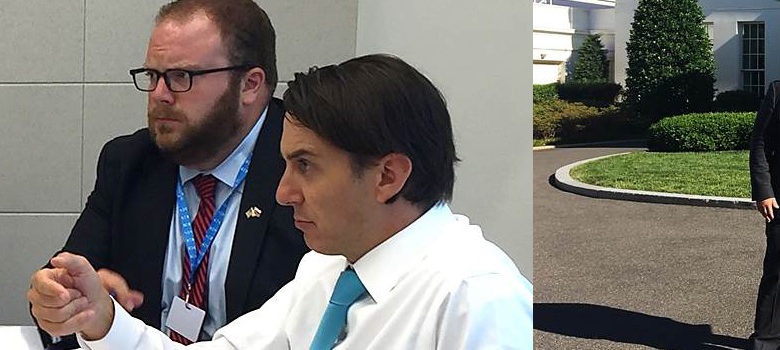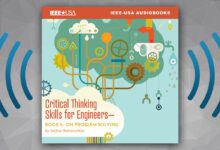
Since his high school years, Benjamin Schmitt has been interested in the potential of fusion energy technologies to change the nature of global energy security. While still attending Greece Arcadia High School in his hometown of Rochester, New York, he began working at the University of Rochester Laboratory for Laser Energetics (LLE), a national resource for laser research. Schmitt’s early work at LLE helped to sharpen his focus on the development of a range of technologies that could help improve geopolitical stability and enhance society’s understanding of the universe.
These days, although not yet 30, this ambitious and determined physics researcher just completed a one-year IEEE-USA Fellowship in Engineering and Diplomacy at the U.S. State Department. His assignment, serving as European Energy Security Advisor, proved so mutually beneficial that he is staying on–at the invitation of the State Department–for a second year. This time, the Department of State is covering the expense.
“The IEEE-USA Fellowship provided me with the ability to help directly advance U.S. foreign policy and national security, through the consideration of the core science and technology elements of key issues,” says Schmitt. “At the same time, this unique opportunity enabled me to add foreign policy and national security expertise to my own portfolio.”
Working in the State Department’s Bureau of Energy Resources, his area of concentration is European energy security.
“The Bureau of Energy Resources is the youngest bureau within the State Department,” explains Schmitt. “It was created in 2011 by Secretary Clinton–partially in response to one of the first major foreign policy challenges of her tenure: Russia’s 2009 gas cutoff of Ukraine. Part of the Bureau’s mission is to address the foreign policy and geopolitical impact that energy has in both European and global energy security. Because we represent the geostrategic elements of energy from a global perspective, this assignment has turned out to be especially meaningful for me.”
Schmitt has maintained a demanding travel schedule, having in one year visited many of the countries in his central policy portfolio, including the Nordic, Baltic and Central European states. In 2016 alone, he has supported senior administration officials and conducted independent diplomatic engagements in France, Germany, Austria, Slovakia, Greece, Poland, Sweden, Denmark, and Finland.
But one of Schmitt’s proudest moments during his IEEE-USA Fellowship took place right in Washington, in May, when he provided key support for the United States-European Union (EU) Energy Council held at the State Department. Participants included U.S. Secretary of State John Kerry and U.S. Secretary of Energy Ernest Moniz, as well as their EU counterparts. Schmitt is also regularly called on by the White House and National Security Council to advise on and develop novel policy solutions using science and technology-based approaches.
Schmitt’s passion for pursuing technologies with the potential for making transformational impacts on the world can be seen in almost every aspect of his academic and professional achievements.
The Max Planck Institute for Nuclear Physics in Heidelberg, Germany, nurtured his zeal for gaining experience in both international research and multinational collaboration. As a visiting scholar in 2006 and a Fulbright Scholar in 2008-09, he worked with a team of researchers from five different European counties to support research collaborations in both Heidelberg and Berlin. He describes it as “invaluable for learning how to interface in transatlantic research collaborations.”
After earning a B.S. in Physics and Astronomy, as well as dual B.A.s in Mathematics and Modem German Languages and Cultures from the University of Rochester in 2008, he went on to receive his M.S. in 2011–before embarking in doctoral research in Physics and Astronomy–both conducted at the University of Pennsylvania.
While pursuing doctoral-level research as a NASA Space Technology Research Fellow, Schmitt leveraged the insights he gained in Germany to work with multinational teams across five continents on a project with a distinctively broad international scope. With a focus on experimental cosmology, he led the development of the novel millimeter-wavelength imaging technologies comprising ACTPol, a polarization-sensitive receiver upgrade for the Atacama Cosmology Telescope (ACT). The six-meter telescope is located in the remote and physically challenging Atacama Desert of northern Chile. The telescope’s location required Schmitt, who had a leadership role in deploying the new upgrade, to travel frequently to the site. It is in a harsh, arid environment; and it sits at an elevation of 17,100 feet (5,190 meters).
“This experience, as well as others, convinced me that one of the most transformative elements to influence U.S. foreign policy over the past 50 years is how the worldwide, rapid growth in fundamental science and technology has positioned these fields at the center of nearly every area of the modern diplomatic portfolio,” says Schmitt. “Policy informed by science and technology has the ability to rapidly enrich relationships between natural allies–as well as help to thaw partnerships with former adversaries and foster economic development of emerging societies.”
Seeking to blend his science and technology interests with practical experience advancing foreign policy and international security, he applied for a 2015-16 IEEE-USA Fellowship. “After I was selected to serve at the State Department,” he says, “I took part in a rigorous, weeklong placement process. It required interviewing with 12 different offices–and I learned about country-specific roles, as well as functional departments ranging from counterterrorism and nuclear nonproliferation, to space and advanced technology.”
He says the European energy diplomacy group within the Bureau of Energy Resources “could not be matched any better to my interdisciplinary professional training.” He is leveraging his technical experience in experimental physics, along with his background working in both domestic and foreign federal research settings to support, advise and help shape U.S. foreign policy decisions–with a special emphasis on advocating for programs that foster strong relations between this nation and EU partners.
Where will his next career step take him? Schmitt quickly states that he can’t give up foreign policy and national security work, but at the same time, he’d like to find an opportunity to continue physics research through a hybrid, multi-disciplinary approach.
“What I am certain of,” Schmitt says, “is the enormous impact that organizations like IEEE-USA have in supporting government fellowships for engineers and scientists. Embedding scientists and technologists to offer their perspective to advancing evidence-based foreign policy is not just good governance, but also a vital necessity to ensure the fundamental security of our nation.”
Helen Horwitz is an award-winning freelance writer who lives in Albuquerque, N.M. She was with IEEE from 1991 through 2011, the first nine as Staff Director, IEEE Corporate Communications.






